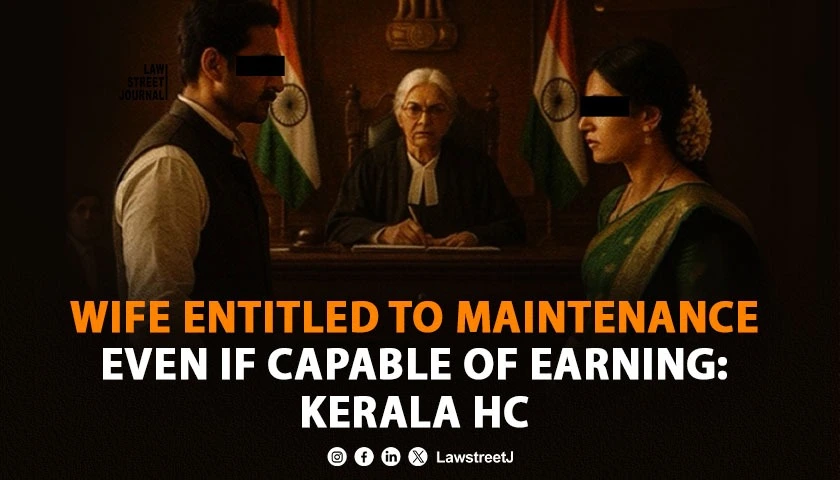Kerala: The Kerala High Court has set aside a Family Court order denying maintenance to a wife, holding that merely having the capability to earn or doing occasional tailoring work does not disentitle a wife from claiming maintenance from her husband, especially when she lacks a permanent source of income.
Justice Dr. Kauser Edappagath made significant observations on the liberal interpretation of maintenance laws as measures of social justice, emphasizing that a wife need not be in a state of penury to claim maintenance.
The court addressed petitions challenging the Family Court, Thalassery’s order dated August 9, 2017. The wife and two children had filed a maintenance case claiming ₹15,000 for the wife and ₹10,000 each for the children. The Family Court rejected the wife’s claim entirely while awarding ₹6,000 per month to each child.
Addressing the legal framework, the court observed, “Section 125 of Cr.P.C. (Section 144 of BNSS) is a measure of social justice, enacted to protect women and children, and falls within the constitutional scheme of Article 15(3) reinforced by Article 39. The object of the provision being to achieve social justice for marginalised members of society—destitute wives, hapless children and parents—it is to be construed liberally for their welfare and benefit.”
The court clarified a crucial legal principle, stating, “It is settled through a catena of decisions that ‘unable to maintain herself’ under Section 125 of Cr.P.C. (Section 144 of BNSS) does not mean that the wife must be in a state of penury.”
Citing Supreme Court precedents, the court noted: “In Rajnesh v. Neha and Another, the Supreme Court held that even if the wife is earning, it cannot operate as a bar to maintenance. In Sunita Kachwaha and Others v. Anil Kachwaha, the husband contended that since the wife was a teacher with sufficient income, she was not entitled to maintenance. The Supreme Court rejected the contention and held that merely because the wife earns some income, it cannot be a ground to reject her claim.”
The court emphasized the distinction between capability and actual earning: “The difference between ‘capable of earning’ and ‘actual earning’ has been clearly highlighted by the Supreme Court in Shailja and Another v. Khobbanna, wherein it was held that a wife who is capable of earning cannot be denied maintenance on that ground alone.”
Examining the factual matrix, the court noted that although the husband claimed the wife was running a tailoring shop, no evidence proved that she was earning. “The mere fact that her marriage certificate shows her occupation as ‘tailor,’ and that she is a member of the All-Kerala Tailors’ Association, would not mean she is actually doing tailoring work and is able to maintain herself.”
Even if she occasionally visited her brother’s tailoring shop abroad and assisted, the court held, “that is not a ground to deny maintenance.”
The court articulated an important principle: “A temporary job, even if it provides some income, will not disentitle a wife from claiming maintenance if she asserts that the income is insufficient for her sustenance.”
On the requirement of valid grounds for living separately, the court reaffirmed that a wife who lives apart without sufficient reason is disentitled to maintenance. However, it emphasized the need to assess whether cruelty or other valid grounds exist.
The wife testified about multiple instances of cruelty, including physical and mental torture. The court found her testimony credible, noting: “This positive evidence was not successfully challenged in cross-examination.” It held that the grounds cited were sufficient to justify her living separately.
On the husband’s income, the court observed that although he claimed to earn ₹750 per day as a tailor, he failed to legally prove this by examining his employer. The court stressed that an able-bodied man cannot evade his obligation to maintain his wife and children.
Finally, the court fixed the wife’s maintenance at ₹8,000 per month from the date of the petition, in addition to the children’s maintenance already granted by the Family Court.
Sri R. Surendran appeared for the husband, while Sri K.C. Santhosh Kumar represented the wife and children.
Case Title: K.K. Chandralekha & K.C. Santhoshkumar vs. (Husband)




![Kerala HC Quashes 498A Dowry Harassment Case Against Live-In Partner, Citing Lack of Relative Status [Read Order]](/secure/uploads/2023/08/lj_5693_1057c042-1e57-4e27-8c9e-25af0ec38ec4.jpg)
![Watching porn on mobile: Kerala HC highlights importance of mother cooked meals, outdoor sports [Read Order]](/secure/uploads/2023/09/lj_9155_Parental_supervision_of_mobile_phone_usage.jpg)
![Lakshadweep MP Mohammed Faizal Disqualified from Lok Sabha After Conviction Suspension Plea Rejected by Kerala High Court [Read Notice]](/secure/uploads/2023/10/lj_9640_87b5fd97-0e05-4ff8-9a99-3be1e4446192.jpg)






